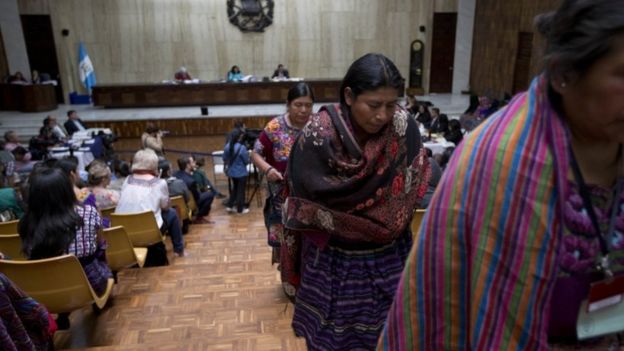By Samuel Miller
Impunity Watch Desk Reporter, North America and Oceania
GUATEMALA CITY, Guatemala — A trial has begun in Guatemala of two ex-military officers for human rights abuses against indigenous women during the country’s long armed civil conflict. The trial marks the first time in history that sexual slavery will be prosecuted as a war crime in the country where it is alleged to have taken place.

The two former military officers are facing charges of murder, rape and sexual abuse, domestic servitude and kidnapping, according to the Guatemalan attorney general’s office.
Prosecutors accuse Esteelmer Reyes, a 59-year-old retired colonel, of authorizing and consenting for soldiers under his command to exercise sexual violence and inhuman, cruel and degrading treatment against Maya-Q’eqchi’ women. Reyes suggested the trial is a political show to make it appear as if Guatemala’s government is doing justice.
“Within the Guatemalan army, during the 36 years of the civil war that we fought, there was not a single murderer. This is all a farce,” the ex-military commander said.
Prosecutor Hilda Pineda, however, said the former military commanders, in an effort to submit the local population to their will, authorized and consented to systematic acts of sexual abuse and inhumane, cruel and humiliating treatment against the victims and other women.
Guatemala’s civil war lasted 36 years. According to the United Nations, five out of every six victims of human rights violations were Mayan. The surviving women, now in their seventies and eighties, testified that the soldiers raped them and burned their houses down after their husbands were killed.
The women said they were then forced to report to the military base in Sepur Zarco in rotating shifts every three days, to cook and clean for the soldiers. The shifts lasted 10 months between 1982 and 1983, a period during which the women say they were still being raped. Some women were reportedly held on bondage for six years until the military base closed in 1988.
María Domínguez, a government advocate for the protection of indigenous women’s rights, said the importance of this case goes beyond the 11 women in this case.
“When you speak about the rape of women during the armed conflict, you’re talking about Guatemala’s history. Their human rights were violated, and this is something that it’s still happening every day. This is a landmark trial for the Guatemalan justice system,” said Domínguez.
This week’s trial against the two former army officials will be the first time that a case involving sexual slavery committed during an armed conflict will be heard in a domestic court.
For more information, please see:
BBC News — Guatemala military sexual violence trial starts – 2 February 2016
CNN — Guatemala tries 2 ex-military officers in sexual abuse of women in civil war – 2 February 2016
Latin Dispatch — Landmark Sexual Slavery Trial Begins in Guatemala – 2 February 2016
Tico Times — Two ex-soldiers tried in Guatemala for sex slavery, murder – 2 February 2016
